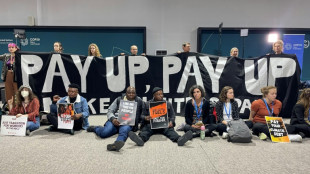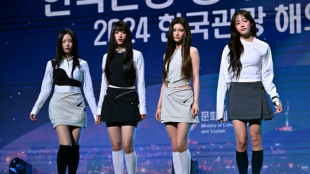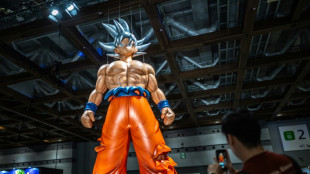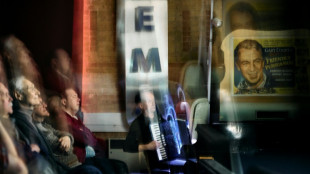
-
 Uganda opposition figure Besigye appears in military court
Uganda opposition figure Besigye appears in military court
-
General strike in Greece against cost of living

-
 UN nuclear chief welcomes Iran's 'concrete step' on uranium stockpile
UN nuclear chief welcomes Iran's 'concrete step' on uranium stockpile
-
Floods to shave 0.2 percentage points off Spain's growth

-
 Argentina's Contepomi makes one change for France Test
Argentina's Contepomi makes one change for France Test
-
'Steep climb' ahead as clock ticks on stalled climate talks

-
 Gatland changes four for Wales clash with South Africa
Gatland changes four for Wales clash with South Africa
-
'Sport will have the last word' as WRC title goes down to the wire in Japan

-
 Western powers move to censure Iran at UN nuclear meet
Western powers move to censure Iran at UN nuclear meet
-
US envoy presses Israel-Hezbollah truce bid in Lebanon visit

-
 'No controversy' around Alldritt exclusion for Argentina Test
'No controversy' around Alldritt exclusion for Argentina Test
-
Stock markets gain, dollar higher before Nvidia earnings

-
 New WHO financing mechanism put to the test
New WHO financing mechanism put to the test
-
Besigye kidnapping: Uganda president's doctor turned rival

-
 Star K-pop producer of NewJeans quits after legal spat with BTS agency
Star K-pop producer of NewJeans quits after legal spat with BTS agency
-
'Eternal' Nadal leaves legacy as he retires from tennis

-
 Vieira takes over at struggling Gerona
Vieira takes over at struggling Gerona
-
Australia's Kerevi banned for Morgan tackle

-
 Bellamy defies 'lunatic' reputation to inspire Wales revival
Bellamy defies 'lunatic' reputation to inspire Wales revival
-
Kremlin says US 'doing everything' to prolong 'war' in Ukraine

-
 Magritte painting nets auction record of $121 million
Magritte painting nets auction record of $121 million
-
Markets fluctuate as traders weigh geopolitical tensions

-
 N. Korea's latest weapon? Bombarding South with noise
N. Korea's latest weapon? Bombarding South with noise
-
'Kidnapped' Uganda opposition figure Besigye to appear at military court: lawyer

-
 Asian markets fluctuate as traders weigh geopolitical tensions
Asian markets fluctuate as traders weigh geopolitical tensions
-
'An inauspicious day': the landmines ruining Myanmar lives

-
 UN to vote again on Gaza ceasefire, US plans unclear
UN to vote again on Gaza ceasefire, US plans unclear
-
Japan's manga powerhouse 'Dragon Ball' turns 40

-
 Japanese, Koreans bottom of global love life survey
Japanese, Koreans bottom of global love life survey
-
Son blames 'mistakes' after South Korea held by Palestine in qualifier

-
 Japan ramps up tech ambitions with $65 bn for AI, chips
Japan ramps up tech ambitions with $65 bn for AI, chips
-
Lights, action, melodrama! Silent films get new reel at London haven

-
 Myanmar led world in landmine victims in 2023: monitor
Myanmar led world in landmine victims in 2023: monitor
-
ICC to sentence Timbuktu war criminal

-
 Ugandan opposition figure Besigye 'kidnapped', says wife
Ugandan opposition figure Besigye 'kidnapped', says wife
-
Australia's Jason Day eyes more major glory after resurgence

-
 Machu Picchu security boosted after visitors spread human ashes
Machu Picchu security boosted after visitors spread human ashes
-
Popovic hails Australia character in 'crazy' World Cup qualifier

-
 Taliban govt clearing 'un-Islamic' books from Afghanistan shelves
Taliban govt clearing 'un-Islamic' books from Afghanistan shelves
-
Argentina beat Peru as Uruguay hold Brazil

-
 Asian markets struggle as traders weigh geopolitical tensions
Asian markets struggle as traders weigh geopolitical tensions
-
Tatum stars as Celtics end Cavaliers unbeaten start

-
 Hurting India under pressure in blockbuster five-Test Australia series
Hurting India under pressure in blockbuster five-Test Australia series
-
'They killed her dream': Israel strike leaves woman footballer in coma

-
 Iraq holds its first census in nearly 40 years
Iraq holds its first census in nearly 40 years
-
Iraqis face tough homecoming a decade after IS rampage

-
 Russian net tightens around last civilians left in eastern Ukraine
Russian net tightens around last civilians left in eastern Ukraine
-
Olympic champion Tebogo aims to inspire next generation of African athletes

-
 Valencia on target as ten-man Ecuador upset Colombia
Valencia on target as ten-man Ecuador upset Colombia
-
'Rust' to premiere three years after on-set shooting


North Korea's tests stir nuclear debate in South
After firing its largest-ever missile, North Korea is preparing to conduct a nuclear test, officials and analysts say, reviving a longstanding debate south of the border: should Seoul have nukes too?
Pyongyang has conducted a blitz of sanctions-busting weapons tests this year, including launching an intercontinental ballistic missile (ICBM) at full range for the first time since 2017.
It was a dramatic return to long-range testing after a years-long pause while leader Kim Jong Un embarked on a round of failed diplomacy with then-US president Donald Trump in 2018.
Renewed North Korean sabre-rattling, coupled with the Russian invasion of Ukraine, has shifted the public mood in South Korea -- with growing demand for their own deterrent.
"Discussions on South Korea possibly pursuing its own nuclear capability have been circulating," said Soo Kim of the RAND Corporation.
"The nuclear option is likely to remain on the discussion table for Seoul's decision-makers. But this, of course, will have implications and reach beyond the Korean Peninsula."
The discussion on whether South Korea should pursue nuclear armaments extends beyond official circles, with a majority of citizens also appearing to support such a move.
Seventy-one percent of South Koreans now favour the country getting nuclear weapons, according to a research paper published in February by the US-based Carnegie Endowment and the Chicago Council on Global Affairs.
- Nuclear test expected -
North Korea has tested nuclear weapons six times since 2006 and touted the success of its last and most powerful one in 2017 -- a hydrogen bomb with an estimated yield of 250 kilotons.
As North Korea's ICBMs are still in development there is a "high risk of failure" each time, said Cha Du-hyeogn, a researcher at Seoul's Asan Institute for Policy Studies.
Last month, a North Korean missile exploded in the skies above Pyongyang.
"That cramps Pyongyang's style," said Cha, adding a nuclear test is less risky.
Another test is likely soon, South Korean officials and the top US envoy on North Korea say, as part of the celebrations for the 110th anniversary of the birth of founding leader Kim Il Sung on Friday.
Satellite imagery shows signs of new activity at a tunnel at the Punggye-ri testing site, which North Korea said was demolished in 2018 ahead of a Trump-Kim summit.
The Vienna-based Open Nuclear Network says it has spotted signs of excavation and increased activity, indicating North Korea may be preparing it for a nuclear weapon test.
- South Korean nukes -
Seoul ran a covert nuclear programme in the 1970s, ending it up in return for security guarantees from the United States.
America stations 28,500 troops in South Korea to protect against its nuclear-armed neighbour, and has recently ramped up military displays, sending an aircraft carrier close by this week for the first time since 2017.
Many commentators see "too clear" parallels with Ukraine's fate: Kyiv gave up its large stock of USSR-era nukes, over which it never had operational control, in return for security guarantees.
"An actual war that we couldn't even imagine broke out and has heightened the importance of self-defence," said Park Won-gon, a professor of North Korean Studies at Seoul's Ewha University.
For its seventh nuclear test, North Korea will likely seek to miniaturise nuclear warheads to mount on its ICBMs aiming "to reach a point where no one can deny it is a de facto nuclear power," he said.
- Nuclear proliferation -
On the campaign trail, South Korea's hawkish new President-elect Yoon Suk-yeol opposed the idea, saying that "strengthening US extended deterrence would be the answer".
This could involve asking the United States to deploy tactical nuclear weapons to South Korea -- something analysts say US President Joe Biden has not shown much interest in.
This would be "far less politically complicating, economically costly, and regionally destabilising than nuclear proliferation", said Leif-Eric Easley, a professor at Ewha University.
But for many South Koreans, a US security guarantee is no longer enough.
While 56 percent of South Koreans support allowing the United States' nuclear weapons in the country, the polled group "overwhelmingly" preferred an independent arsenal over the US deployment option, according to the February research paper.
"At this point, certainly judging by public opinion in South Korea, it doesn't feel like it's enough to know that your friend has a button that they can press," said Scott Snyder, senior fellow at the US-based Council on Foreign Relations.
Th.Gonzalez--AT
